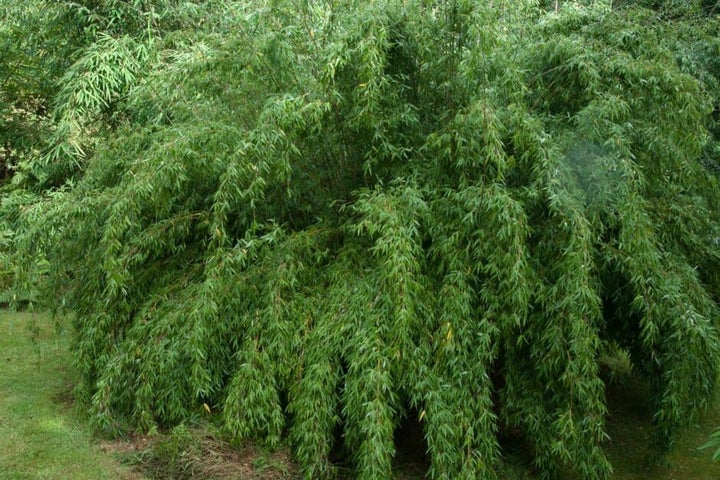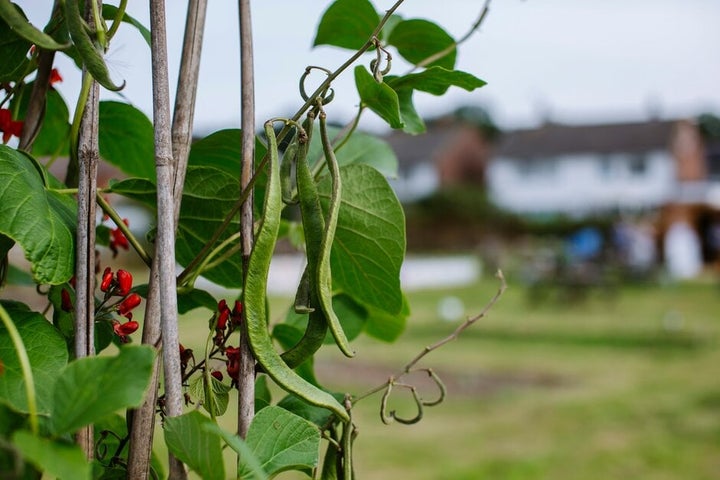
Quick facts
Most bamboos are categorised as having either ‘running’ or ‘clumping’ habits
‘Running’ bamboos send out rhizomes (underground stems) to spread into nearby soil, so often need controlling
Bamboo shoots and canes are incredibly strong and can sometimes grow through cracks and gaps in hard surfaces
Controlling or eradicating bamboo can be difficult, requiring patience and persistence
There are over one thousand species of bamboo; only a small fraction of these are grown in UK gardens
What does bamboo look like?
The bamboos grown in UK gardens produce upright or arching canes (culms) with growing points (nodes) along the length of each . Bamboo leaves are typically lance shaped with a pointed tip. Older leaves naturally drop off, particularly during spring.
Those most likely to be problematic in gardens are ‘running’ types, which produce (underground stems) capable of growing shoots and roots from any nodes along their length. Rhizomes can travel a considerable distance from the parent plant and generally grow in the top 30cm (1ft) of soil. Below are some ‘running’ bamboos commonly seen in UK gardens:
Sasa and Sasaella –often relatively short, they form a thicket of erect stems less than 2m (6½ft) in height. Striped leaves, like those of Sasaella masamuneana 'Albostriata', or dry leaf margins that give the effect of , as seen on Sasa veitchii, make them popular as groundcover or a low hedge. However, they have a vigorous spreading habit, particularly in fertile, moisture retentive soil in partial shade.
Phyllostachys – yellow stemmed Phyllostachys aurea and dark stemmed P. nigra are popular plants due to their coloured stems. In poor, dry soils, they are likely to remain in a clump, but in warm, sheltered areas with moisture retentive soil they often spread, with canes easily reaching 3m (10ft) in height.
Other bamboos considered ‘runners’ include Pseudosasa japonica, Bashania fargesii and Semiarundinaria fastuosa. If you’re not sure which bamboo you have growing in or into your garden, RHS members can use the Gardening Advice service for help with identification.

Is bamboo a weed?
Running types of bamboo spread quickly if given favourable growing conditions and are difficult to eradicate once established, so are often viewed as weeds. Although the aren’t particularly deep, they can spread over 1m (3⅓ft) each year, often unnoticed until they send up shoots, which will compete with other plants for moisture, nutrients, space, and light. Using root barriers, planting in containers, or selecting clump-forming types, such as Fargesia or Chusquea, allows gardeners to enjoy bamboos while keeping them within their allotted space.
While bamboos spreading in gardens can be problematic, they have value as ornamental plants and many practical uses. Bamboos can provide evergreen screening, attractive stems, texture, movement and sound, and they are useful additions to Japanese or tropical style plantings.
For gardeners, a clump of bamboo is a useful source of plant supports and bamboo is utilised in many other ways around the world too – for flooring, scaffolding, furniture, food, tea, fuel, fabric, paper, and much more. Its fast regrowth makes it a sustainable crop, and it is useful for stabilising soils and cleaning-up those containing heavy metals.


What is a weed?
The term ‘weed’ describes a plant that is growing where it isn’t wanted. Weeds usually thrive in average garden conditions, reproducing and spreading easily. It is up to you to decide what you call a weed and what you choose to retain or remove.
Frequently asked questions about controlling bamboo
Here are our answers to your most common questions about dealing with bamboo:
How invasive is bamboo?
A running type of bamboo in favourable growing conditions (usually a sheltered, mild location with fertile, moisture retentive soil) can be . Numerous spread outwards from the parent plant and are able to grow roots and shoots from any nodes along their length. Shoot growth can be rapid, potentially growing to the full height of the bamboo in one growing season. Bamboos can also regenerate from any section of rhizome with a node, so might be spread unintentionally by gardeners chopping up rhizomes when digging or rotavating.

Due to bamboo’s popularity as an evergreen screening plant, gardeners often plant it along boundaries, which can lead to problems with it spreading into neighbouring properties.
Self-seeding is rarely a problem in the UK as bamboos take many years to flower and often die after flowering. If your bamboo does flower and set seed, it is worth checking your garden for and acting quickly to remove them before they become established.
Do I need to get rid of bamboo?
No, many clump-forming bamboos are well-behaved, attractive and useful garden plants. ‘Running’ bamboos contained by physical barriers or grown in dry, poor soil may need monitoring but don’t necessarily need to be removed.
However, when a bamboo is spreading rapidly (especially into neighbouring properties), outcompeting other plants, damaging hard surfaces or in extreme cases damaging buildings, then taking measures to contain its spread or remove it completely are advisable.
Can bamboo cause damage?
There have been cases where bamboos have caused damage to hard surfaces, such as paving and tarmac, and spread into and damaged buildings. Bamboo rhizomes are incredibly strong, and while they can’t puncture or lift solid ground or sound foundations, they can potentially grow into gaps or cracks in walls, floors and drains as they search for new ground to colonise. If you are concerned about damage to a building or structure, it may be worth having it professionally surveyed.
How do I stop bamboo spreading?
There are a few ways to prevent bamboo spreading out of its allotted space and becoming a problem:
Before planting:
- Select a suitable bamboo – consider the space you wish to fill and if the growing conditions are likely to encourage vigorous growth. It is often best to select a clump-forming type.
- Grow bamboo in a container – many bamboos grow well in containers, although the smaller types are most suitable. Containers should be at least 45cm (18in) deep and will require regular watering. Repot every few years, either into a larger container, or by dividing and replanting smaller clumps into the same container.
- Insert a physical barrier when planting – position your bamboo and dig a trench at least 60cm (2ft) deep around it, leaving a sufficient distance to allow your bamboo some space to grow outwards. Insert a physical barrier into the trench. Purpose made bamboo root barriers are easiest to handle and insert. Edges should overlap by at least 30cm (1ft) and be bonded with appropriate mastic. The barrier should extend above the soil level by at least 7.5cm (3in) to prevent rhizomes growing over it. Paving slabs and corrugated iron are sometimes used, but care is needed to avoid gaps that rhizomes could grow through.
Controlling the spread of an established plant:
- Dig a trench – this method is suitable for clump-forming bamboos and slow-growing running bamboos. Dig a trench about 30cm (12in) deep and the width of spade’s blade around your bamboo; aim for the trench to be approximately 30-50cm (12-20in) from the edge of your plant. Sever any rhizomes you find and remove sections that extend beyond your circular trench. Take care to remove any sections of chopped rhizome. Loosely backfill the trench. Doing this at least once a year will keep many bamboos under control.
- Insert a physical barrier – as described in the section above, although additional work is required to sever rhizomes and remove any already spreading beyond where you are going to install the barrier.

What is the easiest way to kill bamboo?
If you have bamboo growing where it is not wanted, there are two options for removing it:
- Dig out the whole plant – this can be a difficult task on mature, established clumps where the root system could be as deep as 1m (3⅓ft), but it will enable complete eradication of the bamboo. Monitor the area for any regrowth, being aware that rhizomes may have spread away from the main plant, and although weakened by the removal of the main plant, they will still have the ability to produce new roots and shoots.
- Hire a contractor – if digging out the main clump of bamboo and its rhizomes is too big a job, hire in a reputable company that specialises in bamboo removal.
Top Tip
Don’t add bamboo rhizomes to your home compost bin, as it is unlikely to reach high enough temperatures to kill them. Instead, put them in your council green waste recycling bin or take them to your local recycling site.
Should I use weedkiller?
No, although non-chemical methods of eradicating bamboo require time and effort, they are effective. The roots and rhizomes of bamboo can be extensive, so even with repeated applications of a systemic weedkiller it can take several years to kill a bamboo.
The RHS does not support the use of weedkillers and recommends that alternative control methods are used. However, when invasive plants are a threat to and gardeners struggle to control them with cultural methods, targeted use of regulated weedkillers may be an option. Garden centres and large retailers selling weedkillers have trained staff who can advise on suitable products for your needs.











